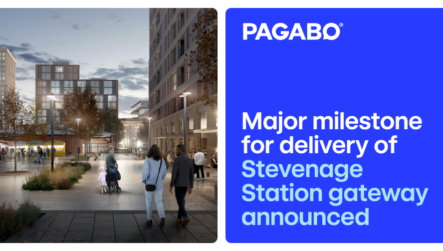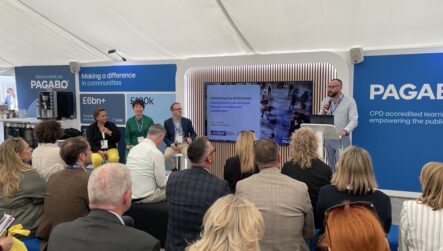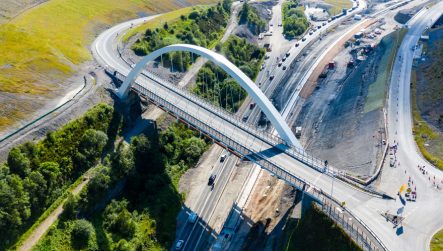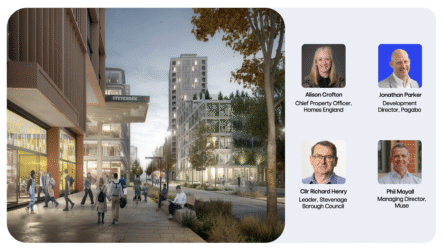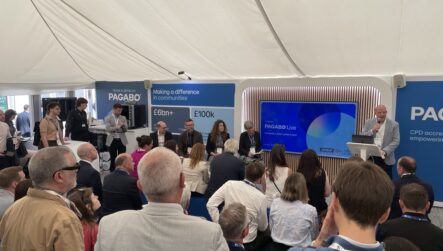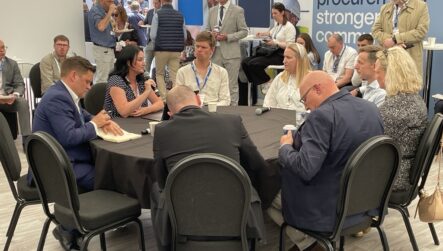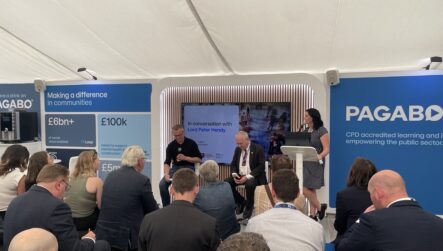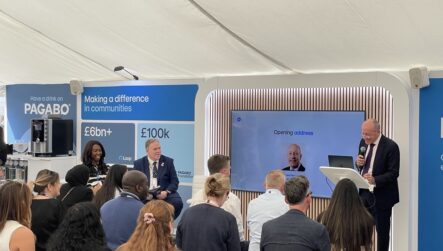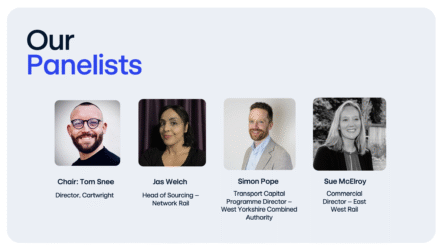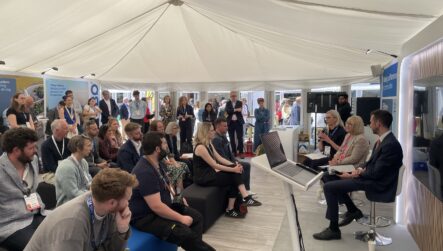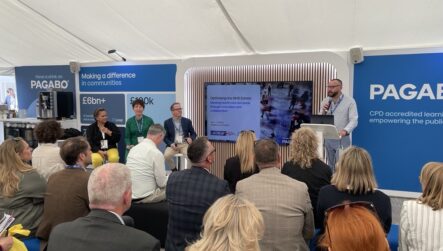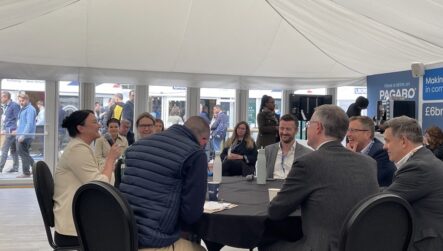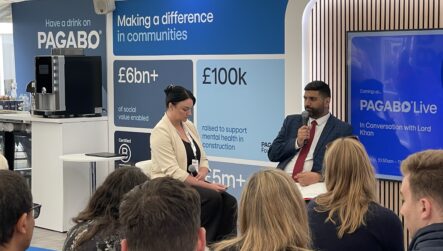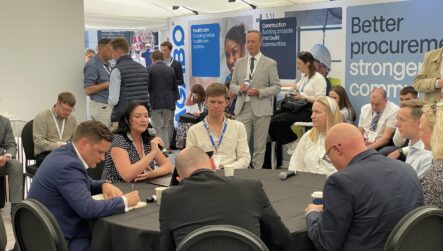Insight Report | White Paper Research Unpicked – Driving Decarbonisation in the Public Sector

Keir Starmer’s government has made some bold announcements for the UK in the net zero and decarbonisation space. This has placed the public sector under the spotlight and seen more pressure applied on meeting decarbonisation project targets. Taking insights from 176 public sector professionals from across the UK, our new industry-led whitepaper explores how the public sector is progressing with their journey towards net zero and whether there are any trends between sector and region.
Our latest edition of Pagabo Live brought together industry experts to discuss common challenges revealed by the data. Presented with insight driven questions, the panel explored innovative approaches to propel the public sector towards achieving net zero targets.
Led by our regular host Tom Snee of Cartwright, our panel for this episode included director of decarbonisation at Wilmott Dixon, Kelly Crews, senior building services manager at Seddon, Jake Dowling and senior associate partner at Baily Garner, Rob Tyler.
Three quarters of respondents don’t think 2035 is achievable
Our first poll gauged the audience’s confidence levels on their knowledge of how to decarbonise their estate. 70% of attendees confirmed that they had low confidence, with considerable room for growth of knowledge.
The panel then dived into something on everyone’s mind – whether the 2035 emissions target is achievable. The feasibility of this timeframe is widely discussed, with Pagabo’s whitepaper revealing only 25% of respondents believed the target is achievable.
Kelly adopted an optimistic stance, suggesting that with the right funding, knowledge sharing and technological upskilling, 2035 has the potential to be the new reality. Funding is key to delivering the size and scale of decarbonisation work required. Addressing the industry skills gap closely follows. Knowledge sharing can accelerate the UK towards decarbonisation becoming a reality and not just an ambition.
The following poll saw the audience sharing confidence levels on whether their organisation will meet its net zero goals on time. On a scale of 1 to 4, with 1 being not very confident and 4 being very confident, 76% of attendees placed themselves either on level 2 or level 3. This appears to reflect Kelly’s optimism that 2035 does have the potential to be the new reality, if the necessary hurdles are addressed.
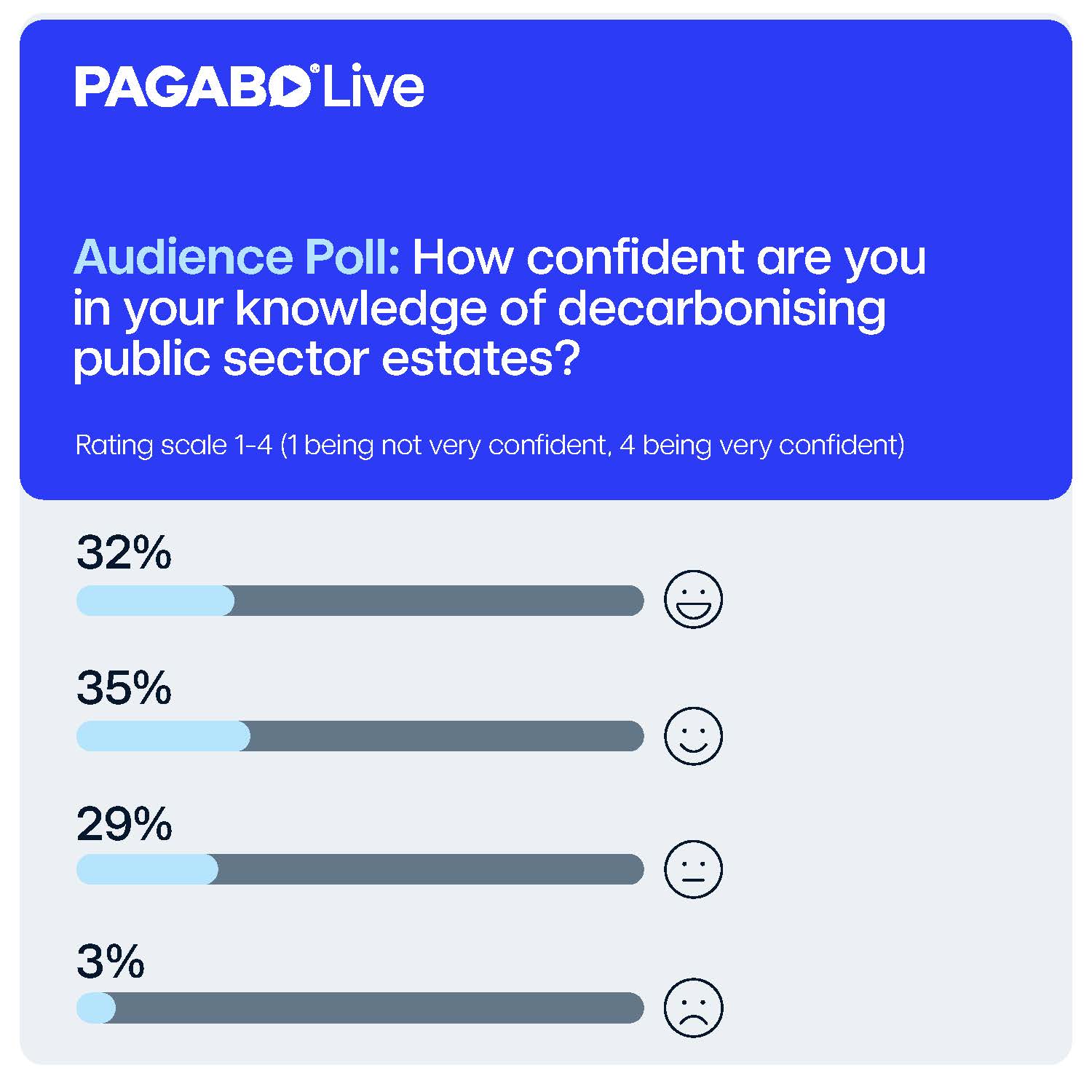
59% of respondents have net zero strategies but face barriers
Many public sector organisations have net zero strategies but admit facing barriers, with few fully embracing all decarbonisation opportunities. Acknowledging this, our panel unanimously agreed that addressing data availability, red tape and the lack of expertise and collaboration could bridge the gap between ambition and action.
Data is vital to turning an idea into something scalable and achievable. Without informative and accurate data, developing strong and robust strategies is a challenge. Driving this commitment to data collection from the outset is key to an achievable and sustainable approach.
The panel then discussed how red tape in strategy development is a key factor to preventing action. Drawing on examples where hospitals were built on 12-week plans when Covid-19 dominated the industry, it was agreed that the red tape can be cut and these delays in strategy development can be addressed.
Where lack of expertise is concerned, decarbonisation as a topic can be overwhelming to organisations that don’t have the necessary skills. Bringing in expertise early to support conversations and identify solutions to deliver the best outcomes is absolutely imperative.
Over half of respondents say the government is not doing enough
The panel agreed that the UK government is showing elements of progression through various initiatives, net-zero hubs and strategy announcements. But, adopting a joined-up approach where knowledge is shared and collaboration placed at the center is vital.
Capturing lessons learned and providing opportunities for support and strategic guidance was discussed by the panel. Advocating a holistic approach to break down siloed thinking, leveraging the knowledge of experts to provide insights and maintaining an aligned approach towards the common end goal, the panel agreed this to be crucial.
Funding was another clear discussion point. Challenges around the funding process are prominent. The panel discussed that although the government appears to be implementing the required strategy, it is now time to address the crucial financial factors that weave into enabling on the ground delivery.
Delivering decarbonsation at scale
It is no surprise that smaller teams and limited capacity was a prevalent challenge faced by the public sector when delivering decarbonisation at scale.
Knowing what stock you have, where it is, what you want to achieve and developing a clear strategy is vital to a planned, phased and achievable approach. Looking at the whole life cost benefit analysis to understand the long-term benefits and pinpoint where strategy priortisation is required is crucial to delivering at scale efficiently and effectively.
An audience poll where 70% of attendees admitted prioritising cost most highly when considering decarbonisation strategies guided the panel to discuss net zero quick wins. Rob advocated looking at a fabric first approach, LED lighting and solar panel investment as ways to make effective progress without breaking the bank. Drawing on our white paper, cost presents itself as a clear and consistent issue, with 75% of public sector professionals admitting that cost outstrips sustainability strategies ‘most’ or ‘all of the time’. The subject of cost must be addressed for the public sector to propel towards government targets.
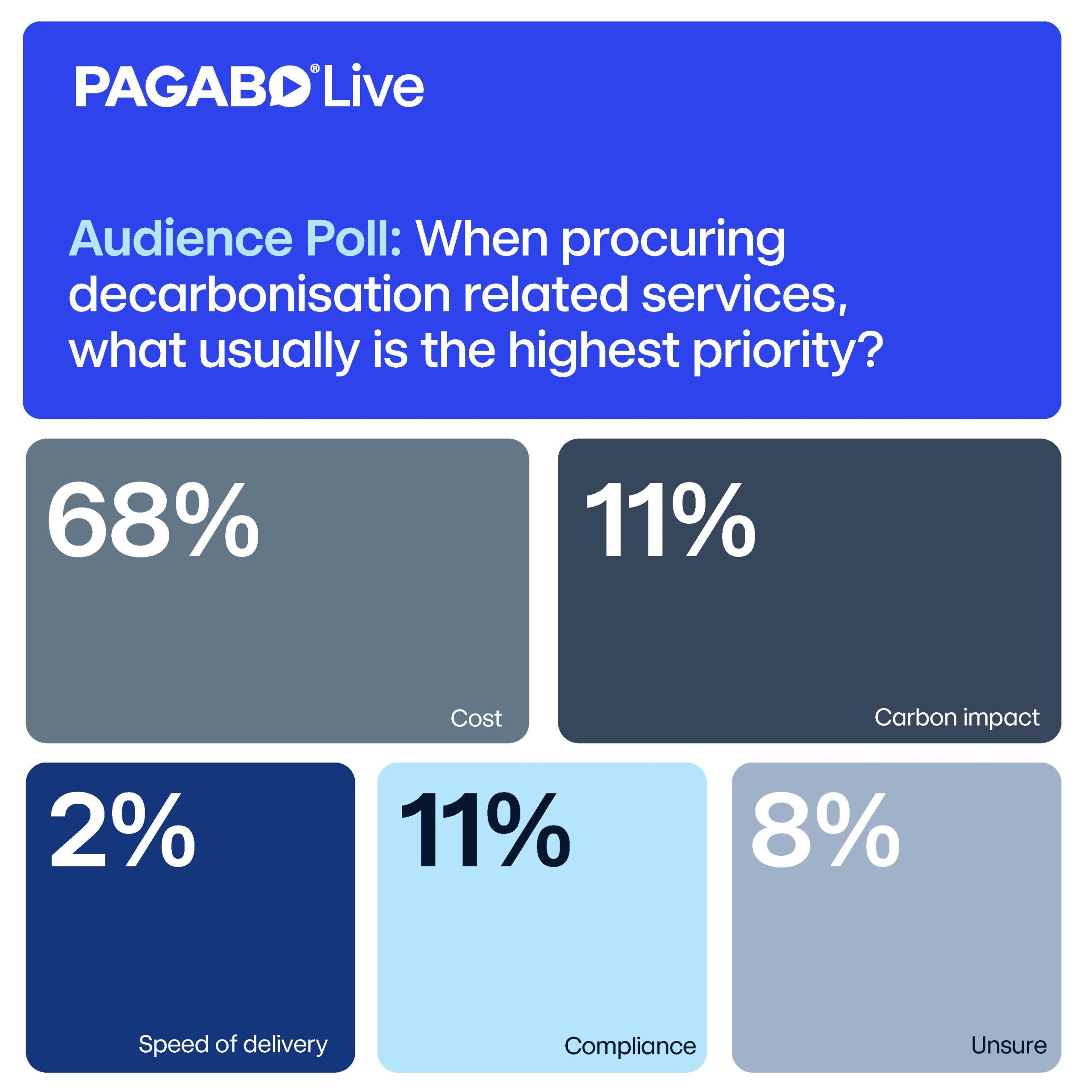
75% of respondents say price takes precedence
The funding journey was agreed to be complex and with the public sector competing for one pot of oversubscribed funding, the nature of the process is a shared challenge for most.
Suggesting how to address this, Kelly and Rob both agreed that a streamlined process with a focus on clarity and a clear criterion is a must. With a lack of awareness and understanding, the complexity of the process is an undeniable hurdle. Drawing on examples where some organisations may lack funding experience, this complexity acts as a deterrent in progressing forward with applications.
Discussing this, the panel maintained a solution-driven stance, suggesting a centralised hub of information and a model where specialists are engaged early to support and guide organisations. Bolstering this, the panel elucidated the need for success and unsuccessful stories. It is in mistakes where learnings are most effectively made. Embracing these learnings and applying them to future action is key to implementing an effective funding process and continuously improving how we tackle the tasks at hand.
The right tools to do the job
With insight showing the minority of organisations strongly consider sustainable procurement, the panel discussed whether the right tools, data and partners are available to utilise an effective procurement approach.
The panel agreed early engagement and collaboration as the driver to seeing the prioritisation of decabonisation in procurement decisions. By collaborating with the right expertise, organisations will place themselves in a better position to understand the true value of decarbonisation within a procurement route.
The panel urged organisations to consider the changing landscape for the future, thinking about how “a pound saved now is not always a pound saved in the future.” With taxes being placed on carbon and inflated energy prices in the not-too-distant future, decisions made now – although requiring additional capital – will place organisations in a better cost saving position in the long term.
Looking at whether organisations have the tools to tackle deeper decarbonisation challenges, insight revealed the adoption of complex interventions appear to be falling behind. Rob and Jake emphasised the importance of undertaking a feasibility study. Having a holistic view and knowledge of the impact of these more complex measures to address these deeper challenges is central to integrating these intricate interventions.
Further supporting this, the panel also focused on the digital capabilities available. To ensure that decisions on more complex interventions are educated and tangible, creating a digital model is a great way to deep dive into impact and performance. By digitally simulating a vision, an accurate indicator of the outputs will be provided, allowing the implementation of an achievable and results driven strategy.
Leading from the front
Lack of senior leadership and cross sector collaboration was flagged as a challenge from the data, especially in blue light services and smaller authorities.
Discussing that leadership is fundamental, the panel agreed setting the correct tone and implementing a strategic vision is the first step to a cultural shift. Bringing the entirety of the organisation into the world of decarbonisation and making it a shared and relatable priority is the driver of change. Simplifying the process down, prioritising knowledge sharing and moving away from a siloed approach is key to bridging this gap between something which must be done and something which an organisation has a drive to get done.
One key takeaway
The episode concluded with each panelist giving a key takeaway. Jake emphasised the importance of understanding your goal and creating measurable milestones. Kelly advocated that by deducing a clear, joined up roadmap and implementing knowledge sharing, the process can be seamless. And finally, Rob highlighted the importance of building confidence by ensuring organisations don’t adopt a one-size-fits-all stance. Understanding the unique needs for a decarbonisation journey to shape strategy and deliver tailored goals is crucial.
Closing the session by revisiting the opening poll, 61% of attendees confirmed that they now felt confident in their knowledge of how to decarbonise a public sector estate. It is clear from this panel discussion that understanding brings confidence and confidence should bring action.
To hear all of the thoughts and experiences shared by our latest Pagabo Live panel, you can watch or listen to the session online now.
Claim your CPD credit
Pagabo Live now has CPD accreditation for its knowledge offering. If you are tuned in live to our sessions, you will receive a link via email afterwards to claim your CPD credit. So, don’t forget to check your email inbox if you have tuned in recently.
Next up
Our next instalment of Pagabo Live will also be taking place in on Tuesday 16 September at 3pm, where another expert panel will be discussing the topic of ‘Smarter Procurement for your Estates – Education in Focus’.
Make sure to register now by visiting www.pagabo.co.uk/pagabo-live.
Discover our frameworks
